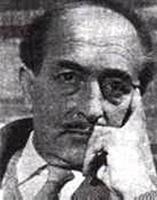| 出生地: | 西西里岛的锡腊库札 | ||||
阅读萨瓦多尔·夸西莫多 Salvatore Quasimodo在诗海的作品!!! | |||||
意大利诗人。生于西西里岛的文化古城锡腊库札,父亲是一个小车站的站长。1916年考入西西里首府巴勒莫技术学校,1919年进入罗马工学院学士木建筑。由于家庭经济困难,中断学习,当过绘图员、营业员等。1926年,被分配到劳工部卡拉布里亚大区土木工程局,担任测绘员。1931年转入米兰土木工程局。1938年离开建筑工程部门,担任著名作家、电影编剧柴伐蒂尼的秘书。随后,进入《时报》编辑部任文学编辑。1939年,由于从事反法西斯活动,被解聘并遭到官方刊物的攻讦。1941年,由于从事反法西斯活动,被聘任为米兰威尔等音乐学院意大利文学教授。1948至1964年,先后在《火车头》、《时报》、《小时》等报刊编辑部主持专栏。1968年6月,因脑溢血突发而逝世。
夸西莫多与蒙塔莱、翁加雷蒂并称为当代意大利最杰出的诗人,是“隐逸派”诗歌的重要代表。早在1916年就开始发表抒情诗。1930年,第一部诗集《水与土》的问世,使他一举成名。此后,他陆续发表了诗集《消逝的笛音》(1932)、《厄拉托与阿波罗》(1936)、《瞬息间是夜晚》(1941)。这一时期的诗作鲜明地体现了隐逸派诗歌的特征。诗人对童年的追忆,对故乡西西里的怀念,对母亲和恋人的情思,无不以富于古典美的和谐韵律和微妙而明晰的意象诉之于诗。
反法西斯抵抗运动使夸西莫多的诗歌创作进入了一个新的境界。自此,他的抒情诗注入了“社会诗”的内涵。个人的忧郁和感喟化为对整个社会和人类命运的深沉思索和对黑暗势力的鞭笞。这一时期,最出色的诗歌结集为《日复一日》(1947)。随后,相继出版的诗集是《生活不是梦》(1949)、《假绿与真绿》(1956)、《乐土》(1958)、《墨汁中的米兰》(1963)和《给予和获得》(1965)等。
夸西莫多精通意大利古典文学和外国文学,他的翻译和研究都发生过广泛的影响。此外,他还著有文艺评论多卷。
1959年,由于“他的抒情诗以高贵的热情表现了我们时代生活中的悲剧”,获得诺贝尔文学奖。
Biography
Quasimodo was born in Modica, Sicily. In 1908 his family moved to Messina, as his father had been sent there to help the population struck by a devastating earthquake. The impressions of the effects of natural forces would have a great impact on the young Quasimodo. In 1919 he graduated in the local Technical College. In Messina he also made friends with Giorgio La Pira, future mayor of Florence.
In 1917 Quasimodo founded the short-lived Nuovo giornale letterario ("New Literary Journal"), in which he published his first poems. In 1919 he moved to Rome to finish his engineering studies, but poor economical conditions forced him to find a work as technical drawer. In the meantime he collaborated with several reviews and studied Greek and Latin.
In 1929, invited by Elio Vittorini, who had married Quasimodo's sister, he moved to Florence. Here he met poets such as Alessandro Bonsanti and Eugenio Montale. In 1930 he was received from Italy's Civil Engineering Corps a job in Reggio Calabria. Here he met the Misefari brothers, who encouraged him to continue writing. Developing his nearness to the hermetism movement, Quasimodo published his first collection, Acque e terre ("Waters and Earths") in that year.
In 1931 he was transferred to Imperia and then to Genoa, where he got acquainted with Camillo Sbarbaro and other personalities of the Circoli magazine, with which Quasimodo started a prolific collaboration. In 1932 he published with them a new collection, Oboe sommerso, including all his lyrics from 1930-1932.
In 1934 Quasimodo moved to Milan. Starting from 1938 he devoted himself entirely to writing, working with Cesare Zavattini and for Letteratura, official review of the Hermetic movement. In 1938 he published Poesie, followed the translations of Lirici Greci ("Greek Poets") in 1939.
Though an outspoken anti-Fascist, during World War II Quasimodo did not take part in the Italian resistance against the German occupation. In that period he devoted himself to the translation of the Gospel of John, of some Catullus's cantos and several episodes of the Odyssey. In 1945 he became a member of the Italian Communist Party.
In 1946 he published another collection, Giorno dopo giorno ("Day After Day"), which made clear the increasing moral engagement and the epic tone of social criticism of the author: the same line characterized his next works, La vita non è sogno ("Life Is Not a Dream"), Il falso e il vero verde ("The False and True Green") and La terra impareggiabile ("The Incomparable Land"). In all this period Quasimodo did not stop producing translations of classic authors and collaborating as a journalist for some of the most prestigious Italian publishings (mostly with articles about theatre).
In the 1950s Quasimodo won the following awards: Premio San Babila (1950), Premio Etna-Taormina (1953), Premio Viareggio (1958) and, finally, the Nobel Prize for Literature (1959). In 1960 and 1967 he received honoris causa degrees from the Universities of Messina and Oxford, respectively.
In his last years the poet made numerous voyages in Europe and America, holding public speeches and public lectures of his poems, which had been translated in several foreign countries.
In June 1968, when he was in Amalfi for a discourse, Quasimodo was struck by a cerebral hemorrhage. He died a few days later in the Hospital of Naples. He was interred in the Cimitero Monumentale in Milan.
Poetical Language
Traditional literary critique divides Quasimodo's work into 2 major periods: the hermetic period up until World War II, and the post-hermetic era until his death. Although these periods are distinct, they are to be seen as a single poetical quest. This quest or exploration for a unique language will take him through various stages and various modalities of expression.
As a young poet, Quasimodo uses a hermetical, "closed" language to sketch recurring motives like Sicily, Religion and Death. Subsequently, the translation of authors from Roman and Greek Antiquity enables him to extend his linguistic toolery. The disgust and sense of absurdity of WW II will also have its impact on the poet's language. This bitterness, however, will fade in the late writings, and will be replaced by the mature voice of an old poet that reflects upon his world.
Opere
Acque e terre (1930)
Oboe sommerso (1932)
Erato e Apòllìon (1938)
Poesie (1938)
Lirici Greci (1940)
Ed è subito sera (1942)
Con il piede straniero sopra il cuore (1946)
Giorno dopo giorno (1947)
La vita non è sogno (1949)
Il falso e vero verde (1954)
Il fiore delle "Georgiche" (1957)
La terra impareggiabile
Il poeta e il politico e altri saggi (1960)
Dare e avere (1966)
